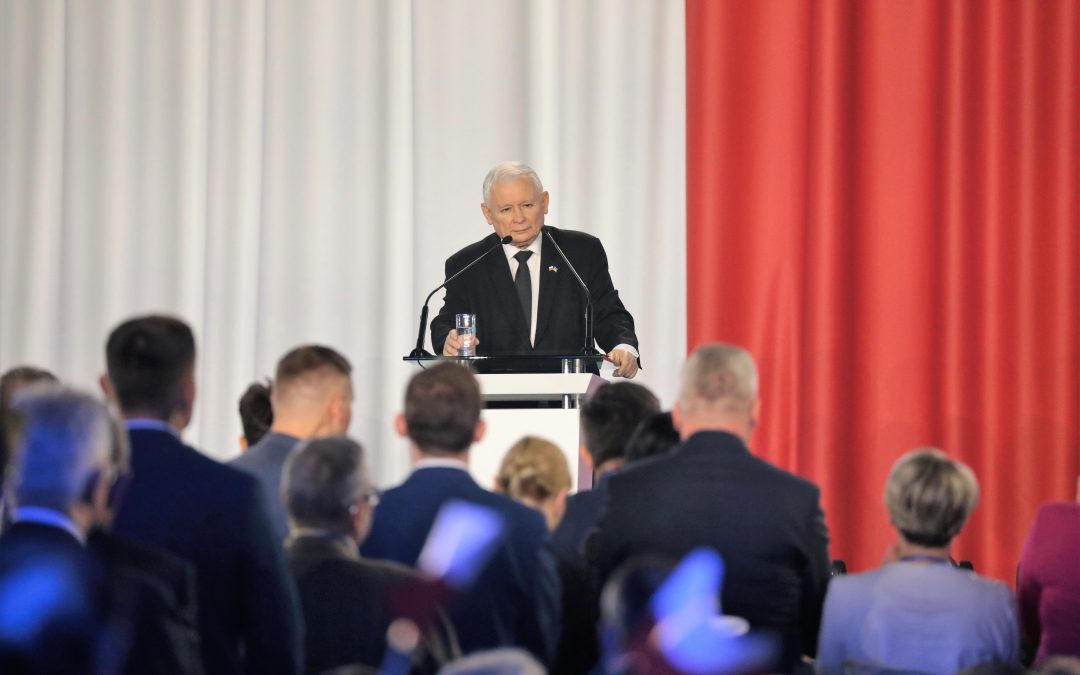Jarosław Kaczyński, the chairman of Poland’s ruling party, has accused opposition leader Donald Tusk of being aligned with Russia’s interests and opposition media of operating in a similar manner to their Russian counterparts.
In an interview with the conservative Gazeta Polska, Kaczyński also said that his Law and Justice (PiS) party’s biggest challenge ahead of parliamentary elections scheduled for next year will be tackling inflation and shielding the most vulnerable from its effects.
#TVPInfo | Zawsze, gdy w grę wchodzi żywotny interes Polski, #Tusk jest przeciw. Bardzo często wówczas jego punkt widzenia jest zbieżny z rosyjską propagandą – ocenił wicepremier i prezes Prawa i Sprawiedliwości Jarosław #Kaczyński. Cały wywiad ukaże się w środę w @GPtygodnik pic.twitter.com/umShlN4iSo
— TOP TVP INFO (@TOPTVPINFO) June 12, 2022
“Whenever Poland’s vital interests are at stake, Tusk is against [them],” said Kaczyński, who, though officially only a deputy prime minister is, as PiS chairman, the most powerful figure in the ruling coalition. “Very often his point of view then coincides with Russian propaganda.”
“Moscow wants to cause chaos on our continent and lead Europe into a serious crisis,” he continued. “There is no grey area: you can be on the side of either good or evil. Tusk stands on the latter.”
As an example, Kaczyński pointed to recent remarks by Tusk – leader of Civic Platform (PO), the largest opposition party – in which he raised concern over Ukrainian grain entering the Polish market and thereby lowering revenue for Polish producers. His comments were reported approvingly by Russian state media.
However, Tusk also made clear it is “indisputable” that Ukraine must be helped. “But it must be organised in such a way that this does not mean severe losses for Polish farmers,” he added.
In his interview with Gazeta Polska, Kaczyński also accused the opposition and its supportive media of “creating a counter-reality”, which he likened to the methods employed by the Kremlin.
“In Russia, the media feeds people with messages that have nothing to do with reality – even being a brutal and crude denial of it – and we also have media [in Poland] that work at least similarly,” said the PiS chairman. “The media is a major constraint on our public debate.”
To demonstrate his point, Kaczyński noted that opposition media claim PiS is supportive of Putin, whereas in fact “we are pursuing the most effective policy of energy independence from Russia in Europe and supporting Ukraine by all means possible”.
PiS has itself been accused by not only the opposition but also many experts of seeking to restrict media freedom. It has turned public broadcasters into government mouthpieces and used state funds and legal action to support friendly outlets and put pressure on critical ones.
As a result, since PiS came to power in 2015 Poland has fallen from its highest ever position of 18th in the World Press Freedom Index compiled by Reporters Without Borders to its lowest ever position of 66th this year.
In response to Kaczyński’s latest remarks, Tusk tweeted that they show PiS believes “the elimination of the media and the opposition is a condition for real public debate”.
In April, Tusk himself accused Kaczyński of “implementing Putin’s plan” by stoking divisions among Poles. Last year he also claimed that the PiS leader was “implementing Putin’s agenda” by allying with pro-Russian parties in Europe.
Gazeta Polska also asked Kaczyński what, apart from the crisis in Ukraine, was the greatest challenge facing PiS. “It is undoubtedly inflation,” he replied.
“We are faced with an extremely important question: will we be able to control inflation during the dozen or so months separating us from the elections, and will we be able to provide relief to those whom it has hit the hardest,” said Kaczyński.
Even before Russia’s invasion of Ukraine, Poland had the EU’s highest levels of inflation. The war has accelerated price rises further, with inflation reaching 13.9% in May, its highest level since the 1990s. Some forecasts indicate the figure will soon pass 20%.
Poland's central bank has raised its benchmark interest rate by 75bps to 6% amid surging inflation.
It is the ninth increase since October last year and brings the rate to its highest level in almost 14 years. pic.twitter.com/gaJu2GBvDw
— Notes from Poland 🇵🇱 (@notesfrompoland) June 8, 2022
The government has sought to shield Poles from the effects of what it calls “Putinflation” caused by Russia’s actions. It has introduced new handouts and tax cuts to soften the blow on people’s wallets. But critics say that such policies risk stoking inflation even further.
Kaczyński defended the government’s actions, arguing that they are necessitated by Poland’s economic circumstances.
“In the West, the fight [against inflation] is waged by limiting the purchasing power of people, and this will probably bring about an effect quite quickly,” he argued. “Wage growth there is much lower than inflation.”
“We cannot follow this path, because it would be felt much more by Poles,” he continued. “We will not limit social benefits; we will lower taxes. We have to explain this to voters.”
Main image credit: Slawomir Kaminski / Agencja Wyborcza.pl

Daniel Tilles is editor-in-chief of Notes from Poland. He has written on Polish affairs for a wide range of publications, including Foreign Policy, POLITICO Europe, EUobserver and Dziennik Gazeta Prawna.




















